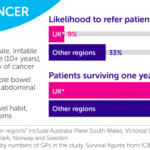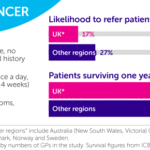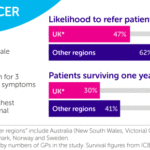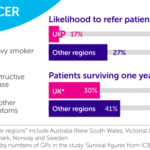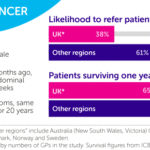An international study from the International Cancer Benchmarking Partnership (ICBP) – a collaboration between six countries from around the world with similar health care systems has blamed delays in referrals by GPs in England, Wales and Northern Ireland as the likely cause of lower cancer survival rates in the UK.
According to the study published in BMJ Open, GPs are less likely to immediately refer people with possible cancer for tests or to a specialist than those in comparable countries. The research also found that cancer survival in the UK is lower lower than each of the other countries examined except for Denmark.
The ICBP research established a link between survival and those countries where GPs were more likely to refer patients immediately and those who did not. The UK based GPs were least likely to refer quickly than their counterparts in Australia, Canada, Denmark, Norway or Sweden.
Researchers analysed survey responses from 2795 GPs on how they would manage different scenarios of patients coming to them with possible cases of either lung, colorectal or ovarian cancer. These were then mapped against survival data for those countries.
GPs were then asked a series of questions including what access they had to specific tests, waiting times for tests and results and whether they could speak to cancer specialists for advice.
More than 70 per cent of GPs in England, Wales and Northern Ireland reported direct access to blood tests, X-rays and ultrasound for possible cancer diagnosis – similar to the rest of the countries. Australian GPs in Victoria reported the highest access – around 99 per cent – to all these tests.
Researchers found evidence that certain tests for diagnosing cancer – CT and MRI scans – were available to around one in five GPs in England while their peers in all other countries reported having at least twice the level of direct access to these tests. Further, GPs in the UK had to wait longer for their results. This suggests substantial room for improvement in support for the UK’s primary care services.
Northern Ireland has the longest waiting times for tests and results of ultra sound and CT scans, around seven to eight weeks for each. England’s waiting time for the same tests was nearly five weeks and Wales was around seven weeks for both types of scan. The best performing region was New South Wales with a total waiting time of around one and a half weeks.
As well as delivering better results for patients, cancers detected at earlier stages generally cost considerably less to treat.
Testing Scenarios
The study revolved around a two-part online survey, and nearly 2,800 GPs took part from across the different countries (although for this study, the UK was only represented by GPs from England, Wales and Northern Ireland).
In the first part, each GP was randomly presented with two of five hypothetical scenarios, each of which described a patient with common symptoms that could be linked to cancer. GPs were then asked how they might act – for example, would they ask the ‘patient’ to come back later? Or prescribe them antibiotics? Or – as you might hope – refer them to a specialist, or for tests?
If at the first ‘visit’, the GP said they would do something other than refer the ‘patient’ for tests or to a specialist, the scenario would continue with the ‘patient’ coming back to the doctor with a change in their symptoms.
The five scenarios were devised to be clinically relevant – two involved patients with potential symptoms for lung cancer, two for bowel cancer and one for ovarian cancer.
The team was looking to see whether there were any international differences between the point at which GPs referred patients for further investigation. Full details can be found in the paper itself, but the slideshow [above] showcases the overall findings.

